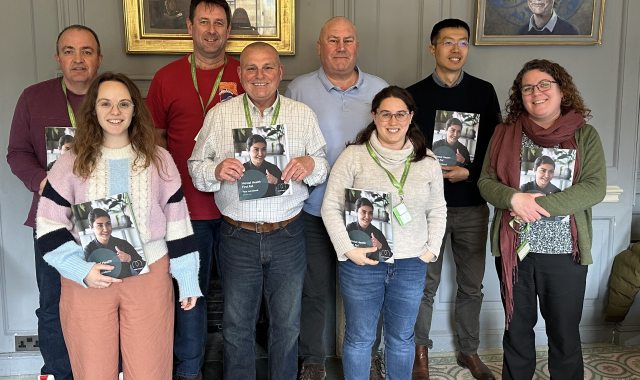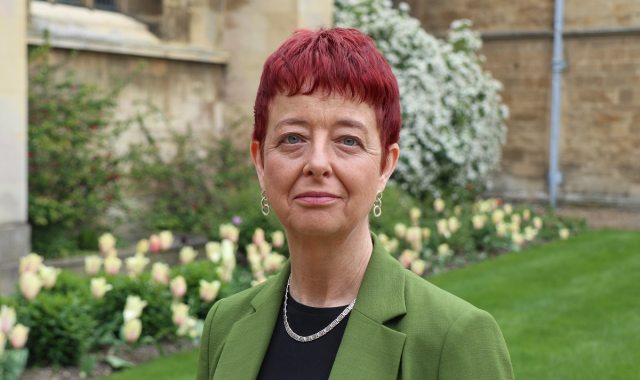Orchids and opportunities
- 04 August 2023
- 4 minutes
Tallis Inger Flecker (Natural Sciences (Physical) 2022) says a greenhouse at their Somerset comprehensive school is to thank for their place at Gonville & Caius College.
“I'm not exaggerating when I say this: the Orchid Project is probably responsible for me getting into Cambridge,” Tallis says.
Tallis attended Writhlington School in Radstock, near Bath. Under the expert guidance of teacher Dr Simon Pugh-Jones MBE, the school became an unlikely place for one of the United Kingdom’s leading orchid propagation laboratories, with thousands of plants originating there.
Beginning in 1991, pupils of the school would support Dr Pugh-Jones with the Writhlington Schools’ Orchid Project (there is now more than one school on the site). Tallis was one pupil who benefitted, initially seeking refuge in the greenhouses, but then they found huge opportunities and personal growth.
Tallis’ Caius interview took place online and, with mock exams taking place in the same week, spaces in school were at a premium. Tallis knew just where to go.
“I did it in the greenhouse where I could lock the doors myself because I had a key and people knew that they couldn't come in at that time,” they say.
“Two of my now supervisors interviewed me and in my first supervision with them each of them went ‘oh, I remember you. You were in the greenhouse’.
“It led to credence to my personal statement, which talked about doing all this stuff.”
Tallis was attracted to applying to Cambridge by her chosen subject.
“It was much less about Cambridge than it was about their Natural Sciences course,” they add.
“And then as I started looking into the course, I found stuff like the supervisions, which was really exciting because I quite liked talking about science.
“The idea that you could do that a lot was amazing.”
Their expectations have been met by the first year of the course, which has been accompanied by a belated realisation that Tallis wishes to follow the path of their parents, both geologists.
They say: “I realised that I wanted to keep doing Earth Sciences when I was finishing the less desirable parts because I was going ‘If I can get through this, then it's the Earth lecture, or the Earth practical – and I can have fun in that’!”
For someone who excelled academically at school, always top of the class, it was liberating at Cambridge to no longer have that expectation, and also to be able to discuss academic work socially.
They say: “I was definitely at a school where you didn't talk about your class work outside of class. That was considered weird.
“So to really love your subject being a requirement for Cambridge means you get to meet people that want to talk to you about interesting things – and that’s loads of fun.
“I can have chats about my course over dinner, with people who aren't even doing my course quite a lot of the time, that are really detailed and technical, and we're all still enjoying it.
“I think that's something that's hugely underrated about Cambridge by people that are thinking about applying.”
To really love your subject being a requirement for Cambridge means you get to meet people that want to talk to you about interesting things – and that’s loads of fun. I think that's something that's hugely underrated about Cambridge by people that are thinking about applying.
Having initially gravitated towards the Orchid Project as a sanctuary from teenage social pressures, it became a gift from which they are still reaping rewards.
They can speak at length about the myriad benefits of the project. They started in Year 7 by sweeping floors and learned skills to do with propagation and aseptic techniques, to maintenance of equipment.
Tallis and the group would explain pollinator relationships, life cycles and orchid anatomy to school children, but also to experts from the Eden Project and at Kew Gardens.
Royal Horticultural Society presentations and prizes, European awards and world recognition followed. Tallis answered questions in an online talk at the World Orchid Congress in Taiwan, which took place in the middle of the night due the Covid-19 pandemic, and travelled extensively with the project.
They also supported a the Sarawak orchid society, SAROSO, with the establishment of an orchid project in a school in Sarawak, dealing with customs, export and biosecurity legislation to take critically endangered orchids out of the UK and into Malaysia. Ordinarily such plants would be the subject of smuggling out of Malaysia.
Britain has 52 native orchids, Malaysia has thousands. Conversations about conservation were more readily listened to, as they were delivered by the same generation.
“It's just a whole bunch of skills where when you say ‘I did this when I was 15 years old’, people don't believe you!” they add.
Horticulture could be a future academic path, but Tallis’ preference is geology.
They have also enjoyed new experiences at Caius, including playing canoe polo with the University team.
“Canoe polo is just a really good moment where once I get on the water, anything academic just disappears,” they said.
They also praised the pastoral support in the College.
“The more I speak to others, the more I realised that the welfare system we've got at Caius is stellar,” they add.


